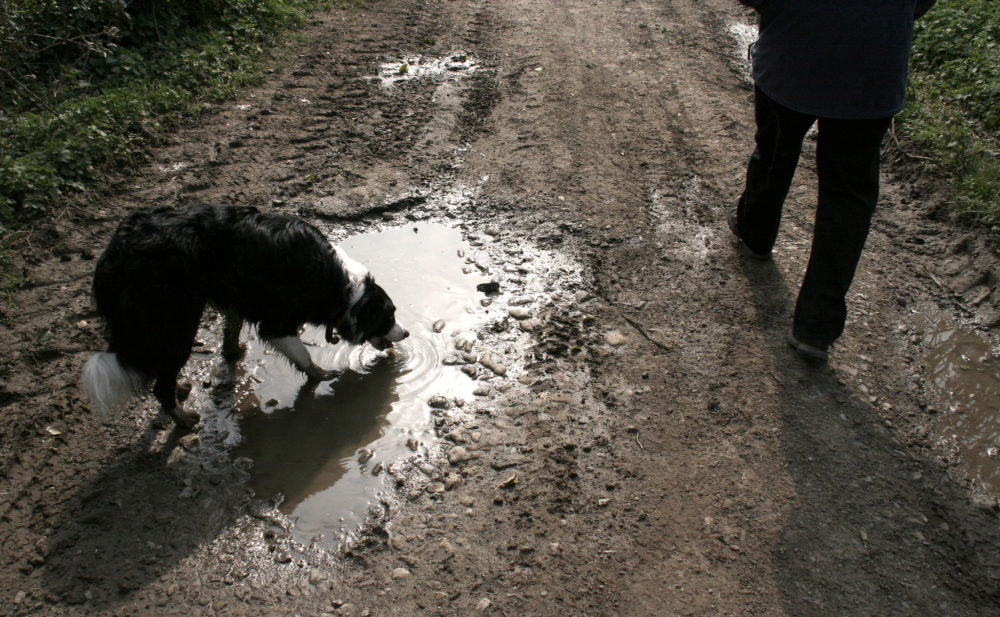Veterinary surgery warns of case of Leptospirosis in Wales

Stephen Price
A Welsh veterinary surgery has confirmed a case of Leptospiros – a life-threatening bacterial infection in dogs which causes a range of symptoms including fever, vomiting, diarrhoea and lethargy.
Writing on Facebook, Summerwood Vets, based in Blackwood, wrote: “Sadly we have had a confirmed case of Leptospirosis in the Blackwood area.”
They added: “Please be aware that Lepto is zoonotic so it can be contracted by humans, as well as dogs.
We urge the public to be vigilant and ensure that their pets are vaccinated against this.”
Leptospirosis
Leptospirosis is a bacterial infection. It causes serious illness by damaging important organs such as the liver and kidneys. It spreads in urine and can live in water or soil for months. Leptospirosis enters the body through the mouth, nose or wounds.
Dogs most commonly catch leptospirosis from infected urine for example from water or soil that has been contaminated with infected urine from another animal (mainly rats). In particular, slow moving or stagnant water such as rivers, lakes, ponds, streams, canals, drains and floodwater.
Rats and other wildlife and farm animals can also be a source, as well as another dog’s infected urine – including sniffing/licking the ground where an infected dog has urinated.
Although rare, Leptospirosis is zoonotic which means it can pass from dogs to humans and cause serious illness. Leptospirosis in people is also known as Weil’s disease. If you’re concerned that you might have leptospirosis, it’s important to contact your GP for advice.
Leptospira bacteria are shed in urine of infected dogs (and other animals) so it’s important to take precautions if your dog is diagnosed with leptospirosis (or suspected of having it).
Always wash your hands carefully after touching your dog and wear disposable gloves when cleaning bedding or anything that might have come into contact with urine. Follow the advice of your vet to keep both you and your pet safe.
Symptoms of leptospirosis vary a lot but can include:
- Jaundice (yellow gums and eyes)
- Vomiting
- Diarrhoea (which can sometimes be bloody)
- Lethargy
- Eating less than normal
- Weight loss
- Drinking and weeing more than normal
- Difficulty breathing or breathing quicker than normal
- Coughing
Some dogs show no or very few symptoms but can still spread the disease. Sadly, a dog can die within just two days of showing symptoms, so contact your vet immediately if you notice any of the symptoms mentioned above.
Your vet will check your dog’s vaccination history and perform an examination. They may recommend blood and urine (wee) tests to check for organ damage and Leptospira bacteria.
These tests might need to be repeated, especially in the early stages of the disease as it can be difficult to diagnose. If leptospirosis is suspected, your vet may start treatment immediately.
Treatment
Treatment includes antibiotics, a fluid drip, anti-sickness medication and pain relief may also be needed
Dogs with leptospirosis must be treated in isolation to prevent them spreading it to other pets and people. This means they will be in their own separate kennel and vet staff will use protective clothing when caring for them. Even after recovering, dogs with leptospirosis can still spread the bacteria in their urine, posing a risk to other pets and people for a while.
Your vet will advise you on the best ways to minimise risks of spread. Unfortunately, some dogs that survive, can develop long term kidney disease.
Sadly, if your dog becomes seriously ill with leptospirosis, you may need to consider putting them to sleep to stop them suffering.
Leptospirosis is a very serious disease. Some dogs recover if they get veterinary help quickly, but dogs with more severe symptoms often die during the early stages of the disease or become so poorly (even with veterinary treatment) that they need to be put to sleep.
Prevention
A yearly vaccination is the best way to help prevent leptospirosis.
There are a few different types of Leptospira bacteria, so there are different vaccinations available. Some vaccines contain two strains of bacteria (L2) and some contain four strains (L4). Fortunately, we can vaccinate against the common types found in the UK.
Speak to your vet about which vaccination will give your dog the best protection. Let your vet know if your dog is more likely to be in a high risk environment with stagnant or slow flowing water, on a farm or near rodents.
For more information, visit the PDSA website.
Support our Nation today
For the price of a cup of coffee a month you can help us create an independent, not-for-profit, national news service for the people of Wales, by the people of Wales.






Exactly the same advice applies to humans except there is no vaccine. Areas where there are rats are high risk as the rats have chronic kidney infection with Leptospiral bacteria and contaminate the wet environment with bacteria from their urine. Farmyards and rivers and water generally are potential hazards. Nothing seems to have changed since I had a student attachment at the VI centre in Jobswell in Carmarthen in 1977 and prepared rat kidney slices with Warthin and Starry stain to show the Leptispires under the microscope in kidney sections.